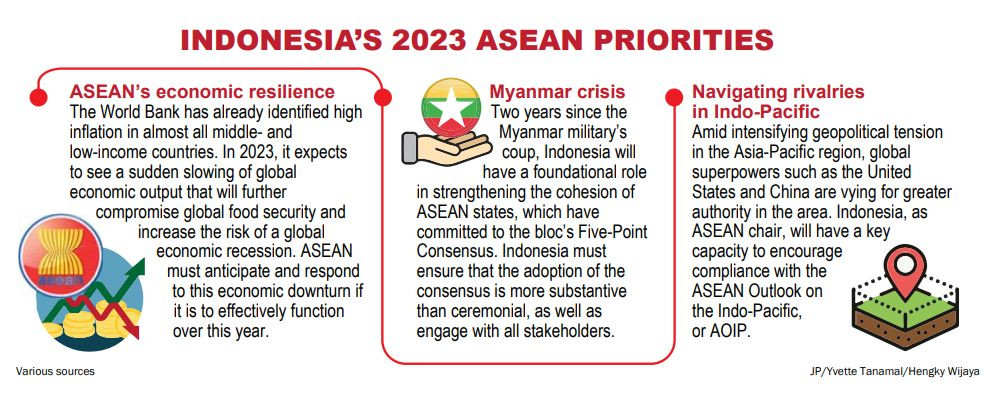Popular Reads
Top Results
Can't find what you're looking for?
View all search resultsPopular Reads
Top Results
Can't find what you're looking for?
View all search resultsASEAN meets under shadow of Myanmar coup anniversary
The shadow of the Feb. 1, 2021, coup looms large over the ASEAN Ministers' Meeting, even as Indonesia seeks to dampen concerns that the bloc would be too preoccupied with the multidimensional crisis.
Change text size
Gift Premium Articles
to Anyone
T
he first ASEAN Ministers’ Meeting under Indonesia’s chairmanship kicks off on Wednesday, coinciding with the second anniversary of the military putsch in Myanmar, where an elected government was toppled to make way for what critics consider as a sham-election redo.
From Feb. 1-5, Jakarta will play host to the first string of foreign-policy meetings under the AMM banner, including a closed-door retreat session on Saturday to candidly discuss issues of shared concern. In line with recent convention, Myanmar would not be represented by any official holding political office.
But the shadow of the Feb. 1, 2021, coup looms large over the Southeast Asian meetup, even as Indonesia seeks to dampen concerns that the bloc would be too preoccupied by the political crisis that erupted after Myanmar’s military usurped power from civilian leader Aung San Suu Kyi.
The government’s management of the crisis would inevitably become a litmus test for its overall chairmanship, analysts have repeatedly warned, even as the Foreign Ministry reaffirmed that the issue would not “take ASEAN hostage” and that economic resilience was a bigger regional priority.
During a hearing with House of Representatives Commission I, overseeing foreign relations, on Monday, Foreign Minister Retno LP Marsudi said that the primary focus of the ASEAN chairmanship would be food and energy security and cooperation in finance and health.
They are the basic building blocks of Indonesia’s theme this year, ASEAN Matters: Epicentrum of Growth.
And while the foreign minister insists Indonesia would continue efforts to broker peace in Myanmar, she also stressed that ASEAN would not pause its other endeavors to cater to Naypyidaw’s needs.
“Hoping that the Myanmar political crisis would completely cease within a year would be downright unfeasible,” Retno said, in one of her more sobering comments on the matter.
“It will not reduce Indonesia’s attention in advancing the development of the ASEAN community building [project],” she told lawmakers.
Over the past two years, the bloc has failed to rein in the junta in Myanmar, despite a growing countermovement and global threats of sanctions and political exclusion.
Emboldened by the lack of international intervention, the junta is keen to redo an election the military lost in 2019.
On Friday, Naypyidaw announced threshold requirements for an upcoming sham election in August, which effectively removed any chance for Suu Kyi’s National League for Democracy (NLD) from participating, Reuters reported.
On Tuesday, the ASEAN Parliamentarians for Human Rights (APHR) released a statement condemning the move, with cochair Charles Santiago of Malaysia calling it a “desperate attempt” to legitimize the junta’s power.
Acknowledging the complexities of the situation, however, Jakarta said it was keen to use quiet diplomacy to engage with all stakeholders in Myanmar, Retno said.
Managing expectations
While analysts are still unsure of Indonesia’s Myanmar strategy, there was some consensus that it would be more productive for Jakarta to focus on laying the groundwork for a long-term ASEAN presence in Myanmar, rather than clinging to the overambitious goal of reintroducing democracy in Naypyidaw.
“What Indonesia can do in one year is to provide the basis for a long-term roadmap for ASEAN in Myanmar. That would be enough,” said Lina Alexandra, head of the international relations department at the Centre for Strategic and International Studies (CSIS), on Tuesday.
“It is no easy task. To be frank, ASEAN cannot do it alone. It needs its dialogue partners,” Lina said at a discussion in Jakarta.
One task could be to fix the Special Envoy mechanism in ASEAN, which had previously been criticized for being a non-starter due to its rotational nature, she said.
Moreover, the ASEAN Charter itself, enshrining the oft-criticized nonintervention principle, has been a stumbling block in dealing with the “unprecedented scale” of the crisis and should be reviewed immediately.
“We agreed to the Charter at the time [2008] because we knew we would definitely be reviewing it in five years. So where is that review now?” said the IR researcher.
For her part, Minister Retno nearly pulled out all the stops in setting up the Office of the Special Envoy, calling up some of the nation’s brightest talents in the foreign service to take on the task.
Day-to-day operations of the Office would be handled by Ngurah Swajaya, a veteran ASEAN diplomat, while Retno’s right-hand man for the Group of 20 presidency, Dian Triansyah Djani, would oversee new developments.
“Everybody will take to the field and keroyokan [pile on] the work. We have taken down all the institutional dividers within the ministry,” Retno said at the House session.
The Office would also closely coordinate with other special envoys, including those appointed by the United Nations, for “better synergy” to help Myanmar escape its political crisis, the minister said further.
This approach replaces the one-man show that previous ASEAN chairs Cambodia and Brunei used to address the Myanmar situation, with minimal success.
In any case, the stakes are clear: some experts insist that Jakarta’s Myanmar strategy would become its most-defining feature.
“What ASEAN does or does not do will impact its credibility,” said Dewi Fortuna Anwar, a senior researcher at the National Research and Innovation Agency (BRIN).
“Indonesia needs to think carefully; whatever it does will define the institutional [framework] of the group,” she said.










